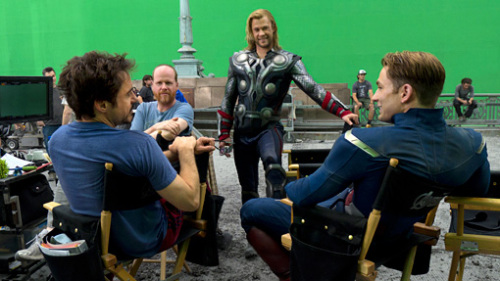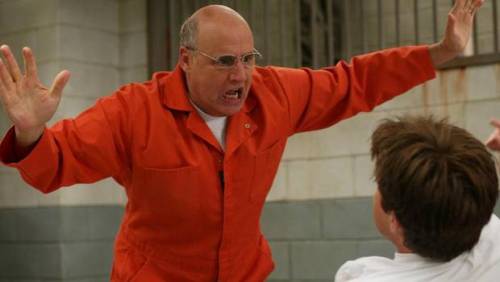In most work places, there are unspoken rules that everybody follows. They are the no-brainers that somewhere along the way you learned from peers, school, and/or from an awkward faux-pas moment.
I remember when I first attended my first super high-end trade show for work, in a bright green dress, fabulously standing out like a sore thumb. I learned very quickly that wearing black is standard for these events. Was it a big deal? Not really, but it was an ignorant mistake that affected the image of our team to customers. However, consider how a small boo-boo like this when combined with, say, coming in late, or my cell phone ringer on full blast during a meeting, could turn into a much bigger problem. These small no-no behaviors in the work place, if compounded over time can easily prevent a promotion, get you fired, or make you the first pick on a round of lay-offs.
During production on a movie or television show repetitive faux-pas or even one poorly timed mistake, can get you booted off the set and out of a job in minutes. A movie set can be a hostile environment and in many cases the crew doesn’t have the time to show a newbie make-up artist the basic dos and don’ts of production. It’s a sink or swim mentality, that relies on the newcomer being observant, extremely courteous, and unafraid to ask overworked and sleep-deprived colleagues to clarify set policies. There is no human resources department to help you out and usually, the closest thing to management support is the lead of your department, who is probably overworked, under-budgeted, on a time squeeze, and couldn’t give a shit if the gaffer yelled at you unfairly. There are unions to protect your rights, but they require a registration fee and a certain levels of experience to become a member. They won’t be able to help you until after an incident and usually only intervene in cases of unfair pay. Even then, if the movie doesn’t participate in union jurisdiction, you may be shit-out-of-luck.
A question you might have is why there are so many rules to film and television production. Firstly, everything is EXPENSIVE! The cost of lights, the camera, and, of course, the crew can be staggering. Secondly, it’s also very time sensitive. In filming, time really is money, since actors, crew members, locations, or/and equipment fees are negotiated by time needed. For example: A studio may only offer the crew two days to use a specific set for a crucial scene. That same set becomes unavailable again for six months. So if after viewing the footage, the director decides they need to reshoot a portion of the scene, the producer has to re-employ the entire crew for that scene, and that may not be possible if, by then, that same crew is booked with another movie. Even the best budgeted and organized productions encounter problems from unprecedented events and circumstances. So rules must be followed, to avoid slowing down valuable production time.
In the spirit of empowering new make-up artists, I’ve collected a few golden rules of on-set etiquette:
Always show up early to set, ready to work.
Duh! Remember that you need to be set up and ready to go before the actors show up. That means make up kit organized and set out in accordance with the scene list for the day. You need to have everything laid out, for maximum speed if the actors show up late, and they almost ALWAYS show up late. If the call time is 8:00AM, get there at 7:45AM, set up, and be ready to help the lead make-up artist. She’ll be impressed, as will the assistant director, who is usually there before everybody else. To gain ground in this industry, you have to be noticed, for good reasons, and being an early bird is the easiest way to gain ground, especially if you show up showered, with a fresh face, and no hangover. This alone will make you stand out among throngs of party animals that work in the make-up industry. Nothing enrages me more than when make-up artists show up with a dirty face from last night’s make-up residue with their pores oozing the scent of poor decisions. Gross.
Turn off your cell phone and put it away until official breaks, lunch, or when the set wraps.
I carry a vehement disapproval of using cell phones for personal reasons when at work, but on a film set, it can actually be detrimental to the project. Depending on the sound equipment, cell phone signals from text messages and calls can actually interfere with the recording. I have been on set where the head of sound production ripped off his headphones after a take and yelled, “Who the FUCK has their cell phone on in here!” It turned out to be a production assistant who was immediately fired. Remember that the “sound guy” has a super sensitive microphone and he’s trained to notice faint noises that might affect production value of the movie. If the actors nail an amazing and difficult scene, and your vibrating cell phone is heard, they may not be able to use that perfect moment and you might be out of a job.
In addition, it’s just plain unprofessional to not be 100% committed to the project. You should be observing the thousands of interesting things going on around you. You can learn so much about film by just being present and watching the production unfold. It’s a great experience to be on set, so be there with the crew, not texting that douchebag you shouldn’t be dating anyhow.
Hot Sets: Don’t touch anything without asking!!
So when a movie set for a particular scene is perfectly put together, the set designer or producers will display a sign indicating that the set is a “Hot Set.” This means that you must stay away from the set and never, ever touch anything inside of it. The DP (director of photography), the gaffer, and the director have plotted out every little detail of the lighting, camera angles, flow, blocking (where the actors physically stand and move about the set) and prop placement for the scene. Even moving something a few inches may alter a very intricately planned set design. Remember that you are not seeing the full picture, or the post-production work that goes into the scene afterwards. Your seemingly harmless curiosity about a set piece may require hours of expensive post-production work or even a reshoot. I have also seen this mistake get a production assistant chewed out when he moved a mug that was purposefully turned to have a company logo facing away from the camera. He put it back with the logo facing the camera, and the DP noticed it after 3 takes. Those takes couldn’t be used, since the budget wouldn’t allow for post-production digital touch-ups. We had to shoot the scene all over again because of a bone-head move.
Don’t ask to go home if the shoot is running late and don’t complain about it.
I’m super guilty of breaking this rule, especially after I started running my current business. It’s the reason I had to quit doing make up as a full time career. I couldn’t handle the hours, and trust me, they are loooonnnnggg hours! The bottom line is, you go home when the shoot wraps for the day, not a second sooner. It doesn’t matter if you were promised a 6:00PM wrap time and it’s now 11:00PM. It doesn’t matter if you have to pick up your kids from school. It doesn’t matter that you had a six hour turn-around the last three nights and they don’t even need you for this last scene. You are part of the crew, and you go home when the day’s work is done. The director is the only person who decides when you are done. So sit tight, bring a book to read, and don’t make any promises to the outside world that you can’t keep.
Never bring a friend or family member.
It’s amazingly cool that you are on a movie set! There are so many neat things happening around you and the cameras are for real!! Just look at the director’s chair with a name on it!!! AWESOME!! It’s tempting, but don’t bring your mom, dad, or friends to show off your cool new gig. You should be proud of landing this job, but it’s not like a regular office with cubicles. As I’ve been very clearly explaining, this is a very detailed and time-sensitive work environment, so why bring an unauthorized individual who may risk your work performance by inconveniencing the crew? All movie productions also have certain privacy and confidentiality standards and your mom’s innocent Facebook pic might jeopardize your contract. Make sure you have a Plan B for childcare as well. If your babysitter falls through or your kid gets sick, you can’t bring them on set. Apart from being in the way, outsiders are a liability to the production. Movie equipment can be dangerous and there are wires all over the floor. It’s easy to get hurt and expensive to replace any damaged gear.
Ask questions!!!
Even if you have been on a set a million times, ask and clarify everything. Each production company and/or director has a different style of set management based on their system for creativity. Have your supervisor take you on a set tour and find out where you will be working and any off limit areas. Find out who you are allowed to talk to during filming, how breaks work, who you should check in/out with, and what to do if you are running late. And very importantly, find out if you are allowed to take pictures on set! Don’t be snapping away on your camera without permission! Seriously, if after orientation, you still have a few doubts about something, don’t just let it ride. Be obnoxious for a few minutes by drilling your supervisor with questions on the first day, so you can be easy to work with throughout the rest of the project. Jot down notes, especially during your first few times on a movie set.
It’s funny, some of you may look at this short list of etiquette and think, “Duh!” But I’ve seen folks get in trouble too many times on set to believe that this is common knowledge. Production sets can be confusing places where many things are going on at once. Always approach each new job with humility, open communication, and honest dedication. You’ll be remembered for it and that will get you more work!
Diva Del Mar










